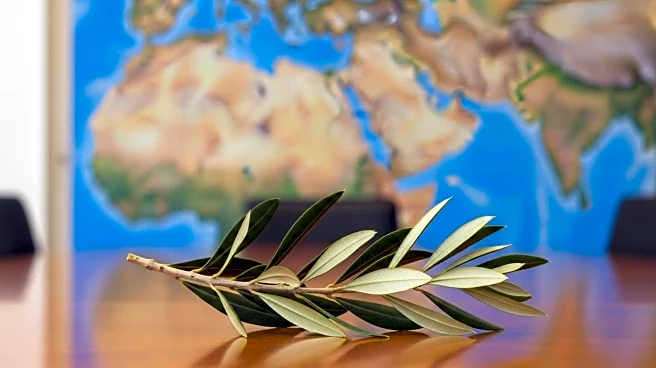What's Happening?
Jacob Lew, the former U.S. Ambassador to Israel, has expressed optimism about the end of a two-year trauma involving Israeli hostages. Lew highlighted the emotional relief as hostages return home, marking a significant moment for the families involved. He also addressed the challenges ahead in reconstructing Gaza and its leadership, emphasizing the need for strategic planning and international cooperation. The situation has been tense, with ongoing conflicts affecting the region's stability. Lew's comments come amid broader discussions on peace and rebuilding efforts in the Middle East.
Why It's Important?
The resolution of the hostage crisis is a pivotal moment for Israeli families and the broader geopolitical landscape. It signifies a potential shift towards stability in a region long plagued by conflict. The reconstruction of Gaza is crucial not only for humanitarian reasons but also for fostering long-term peace and development. Successful rebuilding efforts could lead to improved relations between Israel and Palestine, impacting U.S. foreign policy and international diplomatic strategies. Stakeholders, including governments and NGOs, stand to gain from a peaceful resolution, while failure to address these issues could exacerbate tensions.
What's Next?
The focus will now shift to the reconstruction of Gaza and the establishment of effective leadership. International stakeholders, including the U.S., are expected to play a significant role in providing aid and support for rebuilding efforts. Diplomatic negotiations will likely continue to ensure sustainable peace and development in the region. The success of these initiatives will depend on cooperation between local and international entities, with potential implications for future U.S. involvement in Middle Eastern affairs.
Beyond the Headlines
The end of the hostage crisis and the subsequent focus on Gaza's reconstruction highlight deeper issues of governance and humanitarian needs in the region. Ethical considerations regarding the treatment of hostages and the responsibilities of international actors in conflict zones are critical. Long-term shifts in regional power dynamics could emerge from successful peace and rebuilding efforts, influencing cultural and political landscapes.









